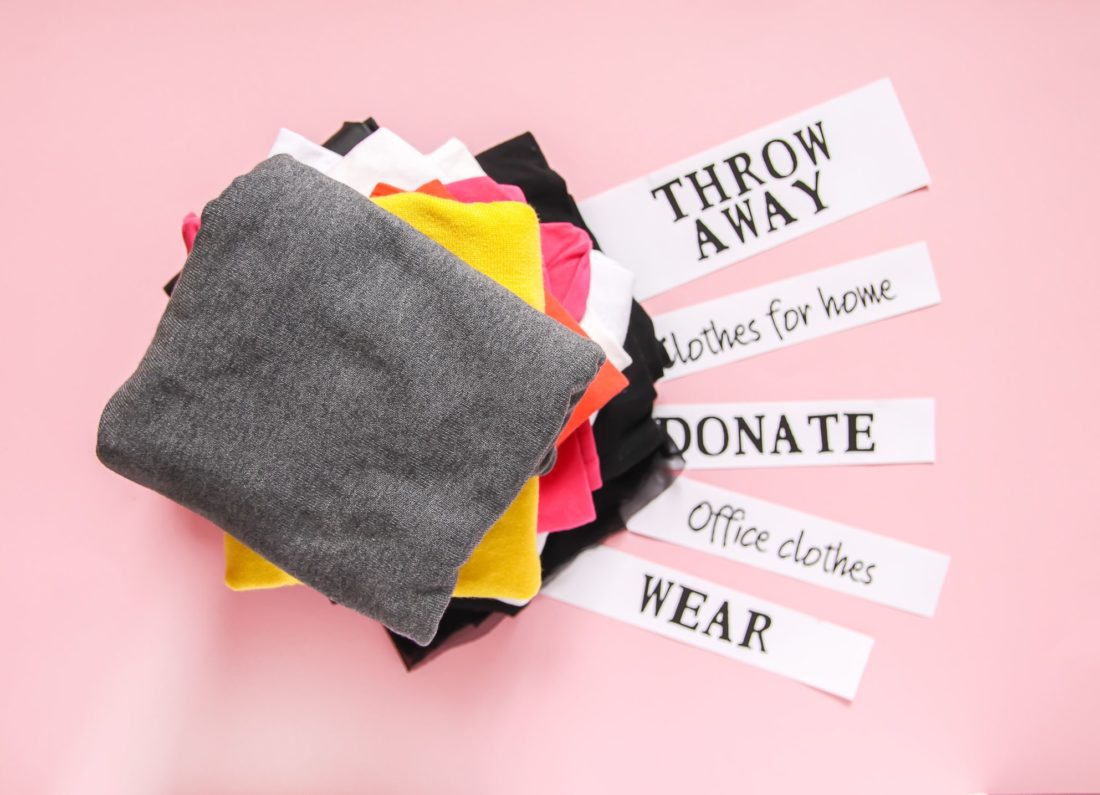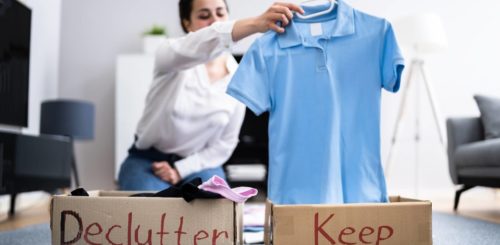Deciding what to keep when moving and what to get rid of can be more difficult than you might think. Since most people connect possessions to some specific memory, the whole process can be pretty emotional. On the other hand, taking all the stuff you have with you is arduous, unnecessary, and expensive to do – since the total cost of cross-country moving is based on the size of your move. Here is how to easily sort things out and make decisions faster!


How to Decide What to Get Rid of and What to Keep When Moving?
Making decisions about what to keep and what to throw away can be really difficult to deal with and can be the major cause of feeling anxiety about relocating. At some point, for all of us, going through the whole process of saying goodbye to some stuff is emotionally draining. And all this happens because we get attached to our belongings, giving them the power to direct our emotions to some extent. Just for the record, in a study led by Lan Chaplin and her colleagues, where they’ve interviewed children aged from 8 to 18 years old, the most common answer to the question on What makes me happy, was related to some material possession.
Learn What to Keep and What to Sell When Moving – Don’t Let the Possessions Possess You
The first connection we build with our stuff is in childhood. Just imagine how disappointed a kid would be to lose their favorite teddy bear or some other toy. Since we live in a world that praises consumerism, buying new things all the time is considered a normal habit that leads to thousands of items stored in our houses without having a real purpose.
Unfortunately, some people get attached to their possessions so tightly that they soon become hostages of their own household items. Although the idea of owning something is alluring, if this feeling overtakes someone’s lifestyle, it can lead to a hoarding disorder, which is a problem for 2-6% of the population in the US.
Use Value Should Be the Top Priority When Determining Whether to Keep or Get Rid of a Specific Item
Being practical and rational when organizing your move is the most effective way to deal with it. And the same should apply when deciding what to get rid of, especially if you’re relocating from a house to an apartment where you’ll have significantly less space at your disposal. In case that some item is broken, or you simply know you won’t use it in your new house or apartment, you should definitely exclude it from the home inventory list.
Keep in mind that the total cost of long-distance moving is based on the size of the move and the number of items on the inventory list. To avoid one of the crucial relocation mistakes and increase the costs unnecessarily, make sure to plan to declutter and put it high on the to-do list. Downsizing will provide you with the opportunity to go through all your possessions before relocating to a new state and consider if it is worth boxing it up and paying for its relocation.
That Pile of Old Stuff Won’t Have Any Use Value in Your New Place – Learn What to Get Rid of When Moving Across the Country
If you’re looking for the cheapest way to move out of state, then skipping the boxing up of all the things you have in your home is the solution. To effectively end the decluttering process and decide what to keep and what to sell when moving, go room-by-room, take all the stuff from the storage areas and start sorting them out in four different piles – throw away, donate unwanted items, sell in a successful garage sale, or keep. This is the most certain way to move efficiently and avoid extra costs, like renting a self-storage. Here are some possessions you should definitely exclude from the packing list!
What to Keep and What to Throw Away – The First Items You Should Purge
If you’re wondering where to start with the purging, we’d highly recommend beginning with clothes. Clothes are the most numerous pieces we have, and going through all of them is necessary to do before deciding to pack or toss them. All the pieces that don’t fit you anymore or are uncomfortable should go. To find out what to do with the surplus clothes and how to purge your closets, take a look at the video below.
Items Cross-Country Movers Won’t Move Due to Law Restrictions
Although it’s hard to find a thing movers can’t ship, there are still some exceptions. The transport of hazardous and flammable products, shipping live plants, as well as the relocation of pets is out of the question with movers, since it is restricted by law. So if you want to take your plants or pets, you should consider alternatives and schedule everything in advance.
Expired Medicines or Cosmetics Are Definitely Not Things You’ll Need in the New House
The next category to go through is the medicine kit, makeup, and cosmetic products. Checking those products out is one of the most common things you forget to do when you move, and if any of those have expired, it is not worth packing them. Still, be cautious when it comes to throwing away medicines since there is a disposal procedure in place, so refer to an authorized institution.
Kid’s Old Toys and Games
No matter if you’re relocating with kids or they don’t live with you anymore, don’t forget to go through their toys and toss out everything they have outgrown. You can always check if some local charity accepts toy donations and get a double win – help children in need and cut the inventory list.


What Items are Worth Moving?
There is no way you won’t feel a little bit depressed after relocating, and the things that can help you overcome these feelings are definitely your memories and other valuables. The greatest worth of these belongings is not how much they cost but how they can turn a house into a home. Here is the definitive list of possessions to keep and incorporate into your new home and lifestyle!
Photo Albums and Other Memories that Are Part of Family Heritage
There is nothing more valuable than memories, which is why including family photo albums in the list is non-negotiable. Once you find yourself miles away from your old life, they can help you feel more like home and build a cozy atmosphere.
Of course, photos are only a tiny fraction of all the belongings you may find too worthy to exclude. Transporting fishing rods that once belonged to your father, relocating a grandfather clock, or even packaging the china that your grandmother gave you are some things you will definitely want to do.
Paintings and Other Art or Antique Furniture Pieces
Packaging paintings, sculptures, antique furniture pieces are definitely a must if those are family heritage or too valuable to sell. That’s why you should come up with packing strategies for relocating them and explore if the long-distance moving company offers specially designed cross-country moving services for this kind of possessions.
If Music Is Your Hobby, Relocating Instruments Will Be a Top Priority
No matter if you want to move a piano or pack a guitar for shipping, scheduling their relocation with a cross-country moving company will be the safest way of transporting them to the next address. Although this can increase the total of your expenses, still, it will be more affordable than risking some of them getting damaged during the transport.
Jewelry Is Something You Should Exclusively Take Care Of
Every piece of jewelry you have should be packed exclusively by you and stored within an essential box you’ll always have nearby. Ensure to buy cushioned boxes to pack necklaces, earrings, rings, and if this box has a lock system, it will definitely be worth buying it!
Electronic Gadgets
Mobile phones, chargers, laptops, PCs, TVs, sound systems, cameras, drones, and similar gadgets should be packed as carefully as possible. If you find it too stressful to do it on your own, consider booking packing services. Since long-distance movers have all the necessary equipment and materials to transport stuff safely to your next address and protect items in storage units, don’t hesitate to book those long-distance moving services and provide complete safety to your possessions.
Documents and All Important Papers
Believe it or not, documents, passports, and other important papers are the most commonly forgotten things to pack. This is the reason why you should organize important documents at home before relocation and have a folder to store them and keep with other relocation essentials.
Small Appliances to Equip the Kitchen Better
Appliances like coffee makers, blenders, mixers, microwave ovens, and similar are worth relocating to the next living place. Since those appliances don’t take too much space and are not too bulky, relocating them won’t be expensive, and it will provide you with the possibility to equip the kitchen more quickly and start preparing meals for the whole family.
Your Car Is Definitely Worth Taking to the Next Address
The thing a majority of people are concerned about when deciding whether to move their vehicle or not is whether it will be too pricey to do it. For that reason, finding a reliable long-distance company that offers auto transport and is ready to explain in detail how car shipping works is of tremendous importance.
Once you find out that shipping your vehicle doesn’t have to break the bank, the only thing left is to prepare your car for shipping and wait until it is delivered to your doorstep. In many cases, car shipping is a better option than selling the vehicle, not to mention that you’ll be able to organize your time the moment you get to the next city. So start searching for reliable long-distance moving companies, check their online reviews, and if they are legitimate movers, contact them and book all the services on time!
Ready to Box Up Your Belongings?
Now that you’re familiar with all the possessions that should be packed or excluded from the packaging list, we are sure you’ll be able to deal with the whole process much more quickly and easily – especially if you plan to hire a reliable company such as Long Distance USA Movers. Just make sure to plan everything in advance, follow our tips, and don’t procrastinate, and everything will go smoothly!
FAQ
What Should I Keep When Moving?
Start by decluttering your home and getting rid of anything that you no longer need or use. This can include old clothing, electronics, and furniture. When deciding what to keep, think about the sentimental or practical value of the item. For example, keep family heirlooms, important documents, and items that are difficult or expensive to replace. Additionally, consider the cost of relocating certain items. For example, it may be cheaper to sell your old sofa and buy a new one when you get to your new home, rather than paying to move it.
How Do I Determine What to Keep When Moving?
Start by creating a list of your essential items, such as important documents, sentimental items, and everyday necessities. Consider factors like how frequently you use an item, its condition, and its sentimental value. Be honest with yourself about what you really need and try to minimize clutter by getting rid of items that no longer serve a purpose in your life.
Should I Get Rid of Everything Before Moving?
While it may be tempting to get rid of everything before a move, it’s not always practical or necessary. Instead, focus on getting rid of items that you no longer use or need, or that won’t fit in your new space. Ultimately, the goal is to make your move as efficient and stress-free as possible, while also reducing the amount of clutter you bring with you to your new home.
How Do I Decide What Items Are Worth Keeping?
When deciding what items are worth keeping, consider factors such as the item’s practicality, sentimental value, and overall importance in your life. Ask yourself questions like “Do I use this regularly?” and “Does this hold a special meaning or memory?” If an item serves a practical purpose or has strong sentimental value, it’s likely worth keeping. On the other hand, if it’s something you haven’t used in a long time or can easily be replaced, it may be better to let it go.
What Are Some Things That I Shouldn’t Keep When Moving?
Some things you shouldn’t keep include items that are broken, damaged, or in poor condition, as they’ll only take up space and may not even be usable in your new home. You should also get rid of duplicates and excess items that you don’t need or haven’t used in a while. Additionally, consider whether items hold sentimental value or are irreplaceable; if not, you may be better off letting them go. Other items you may not want to keep include expired food or medication, hazardous materials, or items that are no longer safe or legal to use.
How Do I Organize Items I Want to Keep When Moving?
Start by grouping similar items together, such as kitchen supplies, clothing, or electronics. Then, consider using labeling or color-coding to help identify which items belong in which room or category. Make sure to pack fragile items carefully in bubble wrap or packing paper, and label the boxes as “fragile” to ensure they’re handled with care. Be sure to pack heavy items on the bottom and lighter items on top to prevent damage or crushing.
How Do I Pack Items I Want to Keep When Moving?
Start by getting high-quality packing materials, such as boxes in different sizes, bubble wrap, packing paper, and tape. Group similar items together and pack them in boxes with labels indicating the contents and the room where they belong. Don’t overpack boxes, as this can lead to damage or make them too heavy to lift. In the and, consider getting packing services from a long-distance moving company and ease the whole process.
How Do I Transport Items I Want to Keep When Moving?
Transporting items you want to keep when moving requires careful planning and attention to detail. Start by getting reputable cross-country moving services and hiring long-distance movers that will secure all items inside the truck with straps or bungee cords to prevent them from shifting during transit.
Keep valuable or sentimental items with you in your personal vehicle, rather than in the relocating truck, to reduce the risk of damage or loss. Besides getting long-distance moving services, consider purchasing moving insurance to protect your items in the event of an accident or theft.
How Do I Store Items I Want to Keep When Moving?
If you need to store items you want to keep, it’s important to choose a safe and secure storage solution. Start by selecting a reputable storage facility with good reviews and a strong security system, including video surveillance and access controls. Consider climate-controlled storage if you’re storing items that are sensitive to temperature or humidity, such as wooden furniture or electronics. When packing items for storage, use high-quality materials and seal them tightly to prevent dust and moisture from getting in. You can also consider getting storage services from a relocation company you’re hiring.
Should I Sell or Donate Items I Don’t Want to Keep When Moving?
Selling items can provide you with extra cash to put towards your move, but it requires time and effort to list and sell the items. Donating items can provide you with a tax deduction and the satisfaction of knowing you’re helping those in need, but it’s important to research charities and ensure they’re reputable and will accept your items. Ultimately, the decision to sell or donate depends on your personal preferences, the condition of the items, and the amount of time and effort you’re willing to invest. If you have items that are in good condition and can benefit others, donating them can be a great way to reduce waste and help those in need.






